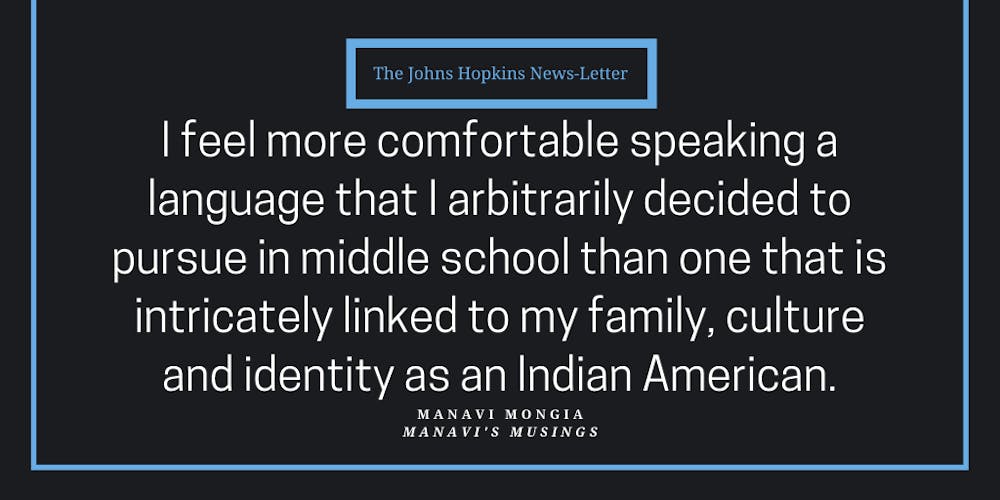
From my fall semester in Paris, I remember one interaction at a grocery store particularly well. I initiated basic small talk in French with the cashier, who seized upon my American accent and responded in English. When he handed me a receipt to sign, he said, “I need your autograph,” unintentionally implying that I was a celebrity. I lived off of this glory for the rest of the semester. It made up for all the other times that my French was shot down.
Indeed, my French has faltered many times, especially in rather unforgiving environments like Paris. Yet I have always felt more confident speaking it than Hindi, the language I grew up hearing. My parents, who are Indian immigrants, have always spoken it at home, but never pushed me to when I was growing up. As a result, I can understand basic Hindi, but am utterly paralyzed whenever I try constructing a coherent sentence. When I do so, the French language often invades my thoughts, making it even harder to conjure the right combinations of words.
It is odd to me that I feel more comfortable speaking a language that I arbitrarily decided to pursue in middle school than one that is intricately linked to my family, culture and identity as an Indian American. Learning French in school was something I eagerly embraced, while my relationship with Hindi at home remained ever tenuous.
I have often felt guilty about this relationship. As a child, I frequently found myself growing nervous when I was meant to speak with relatives in India on the phone. Years ago, especially with two younger cousins, who had just begun learning English, I dreaded the silence that would inevitably follow the basic “How are you?” and “What are you doing?” that was familiar to them. Cycles of the same fruitless conversations would repeat, only ending when I would hurriedly pass the phone back to my mother.
Over the years, my cousins’ comfort in speaking English has grown, and the distance between us has consequently diminished. I am grateful that we have progressed far past awkward silences to regular FaceTimes, as well as the truest form of communication: exclusively sending each other Bitmojis.
But with my older relatives in India, my inability to communicate in Hindi has, at least partially, prevented similar growth in my relationships with them. It also feels wrong that my younger cousins had to adapt their language to mine. I was incapable of connecting with them in the language most natural to them — one that should have been immensely more natural to me.
The way words in Hindi stumbled out of my mouth would leave me self-conscious and vulnerable. My attempts to speak it were often met with occasional teasing from various family members. The teasing was certainly lighthearted, but it reinforced my own failure to assume the language as one of my own. The fact that I couldn’t speak Hindi reduced me to being viewed by my family as wholly American. On the other hand, my older sister, who was born in India and lived there for the first six years of her life, so gracefully embodied the confluence of these two identities. My language barrier exacerbated the palpable distance between me and my extended family and between the opposing poles of my identity as a first-generation American.
After coming to college, my desire to speak Hindi has persisted, yet my skills have not improved. When on breaks at home, I often resolve to force myself to speak it with my parents; however, I never end up carrying out my plans. Now that I’m home once again for the (un)foreseeable future, I hope that I can finally begin to feel more comfortable with speaking the language and thus fill a lingering void. Neuroplasticity has nothing on me.





